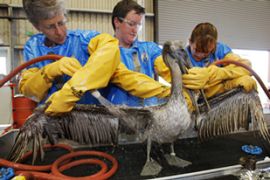BP prepares to siphon spilled oil
US officials ask energy firm to clarify payment plans as tube to suck up oil is assembled.

“The public has a right to a clear understanding of BP’s commitment to redress all of the damage that has occurred or that will occur in the future as a result of the oil spill,” Ken Salazar, the interior secretary, and Janet Napolitano, the homeland security secretary, wrote.
“Therefore, in the event that our understanding is inaccurate, we request immediate public clarification of BP’s true intentions.”
Failed first attempt
The leak was caused by an explosion on April 20 aboard the Deepwater Horizon rig which killed 11 oil workers.
Initial attempts using robotic submarines to insert the 1.6km tube into the underwater oil pipe failed on Friday.
| in depth | |
|
Doug Suttles, BP’s chief operating officer, said the company pulled the insertion tube back to the surface to readjust its connection to a tanker intended to collect oil at the surface.
The tube could capture more than three-quarters of the leak. The company must also contend with a smaller leak that is farther away.
Al Jazeera’s Nick Spicer, reporting from Grand Isle on the Louisiana coast, said the operation was promising a possible end to the leak.
“But it’s not promising any kind of end to the damage that has already taken place along the coastline in terms of jobs,” he said.
“Here on Grand Isle, all the hotels are empty. Tourism has been hit. And then there’s the possible environmental damage. Much of the oil is still floating under the surface of the ocean.”
Beaches contaminated
Mark Proegler, a BP spokesman, said oil washed up in Mississippi for the first time in the state on Saturday, when tar balls were discovered at Long Beach.
Oil has now contaminated several beaches in three states after it was also located at sites in Louisiana and Alabama.
Researchers from the National Institute for Undersea Science and Technology reported this week that they had detected large oil plumes from just beneath the surface of the sea to more than 1,200 metres deep.
|
“It could take years, possibly decades, for the system to recover from an infusion of this quantity of oil and gas.” Samanta Joye, marine science professor |
Three or four large plumes have been found, at least one that is 16km long and 1.6km wide, Samantha Joye, a marine science professor, said.
The researchers were testing the effects of large amounts of subsea oil on oxygen levels in the water. The oil can deplete oxygen in the water, harming plankton and other tiny creatures that serve as food for a wide variety of sea critters.
Oxygen levels in some areas have dropped 30 per cent, and should continue to drop, Joye said.
“It could take years, possibly decades, for the system to recover from an infusion of this quantity of oil and gas,” she said.
“We’ve never seen anything like this before. It’s impossible to fathom the impact.”
BP, meanwhile, began spraying chemical dispersants on Saturday beneath the sea, a contentious development because it has never been done underwater.
Dispersants break down the oil slick into smaller particles, which are then more easily broken down by natural processes.
Dispersants dispute
The manufacturer of the chemicals says their environmental impact is “moderate to low”, but some environmental campaigners say the dispersants can actually make the problem worse.
Paul Horseman of Greenpeace told Al Jazeera from Louisiana that the action of the dispersants “pushes the oil further into the marine environment”.
“It makes the oil and dispersants mixture much more available to the food chain, to the smaller animals, and therefore can actually cause deeper, more longer-lasting damage than just the oil itself,” he said.
The permanent solution to stopping the leak is considered to be a relief well that BP is drilling. It is about halfway done and still months away from being completed.
Obama criticised oil drillers and his own administration on Friday as he ordered extra scrutiny of drilling permits.
He condemned the shifting of blame by oil executives and denounced a “cosy relationship” between the companies and the federal government.
